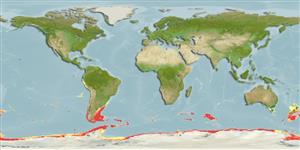Ascidiacea |
Stolidobranchia |
Molgulidae
Environment: milieu / climate zone / depth range / distribution range
Ecology
Sessile; depth range 0 - 1000 m (Ref. 3435). Polar
Southwest Atlantic, Indo-Pacific and the Antarctic: From Antarctica to sub-Antarctic islands and South America.
Length at first maturity / Size / Weight / Age
Maturity: Lm ? range ? - ? cm Max length : 10.0 cm WD male/unsexed; (Ref. 2588)
This Molgula is the largest species of the genus in the Antarctic; it may reach 10 cm in diameter for the body and 20 to 30 cm in length for the peduncle (Ref. 2588). Known from depths of 0 to 1000 m (Ref. 3435).
Life cycle and mating behavior
Maturity | Reproduction | Spawning | Eggs | Fecundity | Larvae
Members of the class Ascidiacea are hermaphroditic; both cross- and self-fertilization is typical. Life cycle: Eggs develop into lecithotrophic larva before metamorphosing into benthic adults.
Tatian, M., R.J. Sahade, M.E. Doucet and G.B. Esnal 1998 Ascidians (tunicata, ascidiacea) of Potter cove, South Shetland Islands, Antarctica. Antarc. Sci. 10(2):147-152. (Ref. 1753)
IUCN Red List Status
(Ref. 130435: Version 2025-1)
CITES status (Ref. 108899)
Not Evaluated
Not Evaluated
Threat to humans
Human uses
| FishSource |
Tools
More information
Trophic EcologyFood items (preys)
Diet composition
Food consumption
Predators
Population dynamicsGrowth
Max. ages / sizes
Length-weight rel.
Length-length rel.
Length-frequencies
Mass conversion
Abundance
Life cycleReproductionMaturityFecunditySpawningEggsEgg developmentLarvae PhysiologyOxygen consumption
Human RelatedStamps, coins, misc.
Internet sources
Estimates based on models
Preferred temperature
(Ref.
115969): 0.2 - 9, mean 3.2 (based on 414 cells).
Fishing Vulnerability
Low vulnerability (10 of 100).
Price category
Unknown.
